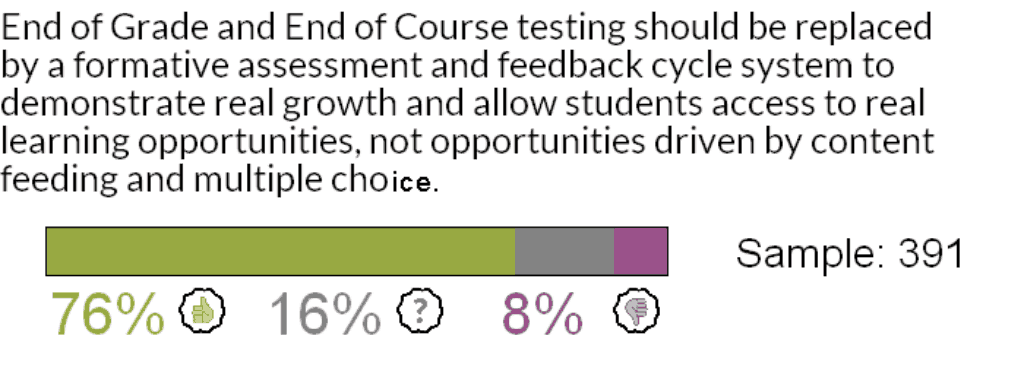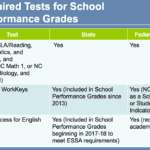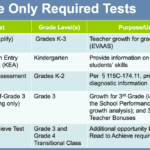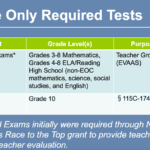Standardized testing is a commonly-discussed education topic on both the national and state level. In higher education, the conversation around the role of standardized testing in college admissions is in the spotlight as some schools have decided to no longer require applicants to submit SAT or ACT scores. In North Carolina, the role and amount of student assessments in K-12 schools has been the topic of many initiatives and conversations. This piece will review current efforts to reduce standardized testing, information on which tests are federally- and state-mandated, and weave in the results of the People’s Session along the way.
State vs. federal standardized tests
North Carolina has limited ability to change federally-mandated tests. The state can make small tweaks, but ultimately the tests must be given. These federally-mandated tests include: End-of-Grade (EOG) exams for ELA, reading, math, and science; End-of-Course (EOC) exams for math, biology, and English; and WIDA Access for English language learners. The ACT and WorkKeys are also required in North Carolina and used as a federal school quality for student success indicator.
Among state-mandated tests, North Carolina has more freedom to design how tests are given and the content of the tests. The state could decided to eliminate these tests completely. The standardized tests currently given at the state level are: mClass for grades K-3, Kindergarten Entry Assessment, K-2 Math assessment, Beginning-of-Grade 3 for ELA/reading, Read to Achieve test for grade 3 and grade 4, pre-ACT test for grade 10, and NC final exams for grades 3-8 math, grades 4-8 reading, and high school courses that are non-EOC math, science, social studies, or English.
The following charts outline those requirements.
During the People’s Session, 67% of participants agreed that all standardized tests not mandated at the federal level should be eliminated. As shown above, that would eliminate tests such as NC Final Exams and mClass.

“There is testing, remediation, retesting, Read to Achieve Testing, mClass testing, and the list goes on. It’s stressful to everyone involved. A certain amount is needed but not as much as we currently have. During the last week of school, children in 3rd-5th are not enjoying fun activities — they are going through remediation or enrichment. Those going through remediation will be retested. We’ve had children miss field days, their award ceremonies, teachers miss these activities, etc. because of testing. Sad.” — Cumberland County
Statewide efforts to reduce testing
In November, the State Board of Education discussed and heard a presentation about assessments in North Carolina and the possibilities of eliminating or streamlining them. Representatives from the Department of Public Instruction laid out which tests are required by the federal government, which by the state, and what wiggle room North Carolina has as it tries to lessen the burden on students. At its April meeting, the board voted to eliminate the NC Final Exams for science in fourth grade and for social studies in both fourth and fifth grades.
In January, State Superintendent Mark Johnson announced initiatives to reduce the testing currently required for students in North Carolina’s public schools. Johnson later released his budget in March which included over $10 million to reduce testing stress on students and teachers. Included in his plan are reducing the number of questions on tests and the time students are sitting for tests, changing policies to reduce stress on students during testing, and working with local leaders to eliminate local testing.
Earlier this month, the Governor’s Commission on Access to Sound Basic Education looked at where the state is with testing and accountability, what a balanced assessment system could look like, and how data the state collects translates to supporting schools.
In the General Assembly, a Senate education committee recently took up a bill to reduce testing in North Carolina. Sen. Jerry Tillman, R-Randolph, sponsored this bill and said it came about in response to recommendations from Superintendent Johnson.
The bill would eliminate the NC Final Exams and would also require districts to monitor the number of local tests given and how much time their students spend taking them. If the amount of time is greater than the state average, then the district would have to come up with a plan to reduce local testing to meet the state average. This bill heads to the Senate rules committee next.
The House has its own testing reduction bill: House Bill 377. It would change testing at the K-8 grades by getting rid of end-of-grade tests and replacing them with three shorter tests, dubbed “check-ins” throughout the school year. In high school, the end-of-course tests would be replaced with a national standardized test, like the ACT. NC Final Exams are also nixed under the bill. Local school systems wouldn’t be allowed to add their own standardized tests to the mix as part of this legislation. HB 377 passed the first reading in the Senate and then moved to the Senate rules committee.
Interestingly, only 10% of People’s Session participants felt that standardized testing does a good job of evaluating student learning.

However, 77% felt that some level of standardized testing is necessary to understand how students are doing.

“I feel that the classroom can be better served if testing is reduced. I firmly believe that some of the tests being given are not true indicators of actual learning. Students are asked to justify their thoughts and lines of thinking with textual evidence, but then we tie their hands with a multiple choice test. Testing is contradictory to what is being taught in the classroom!” — Guilford County
The People’s verdict
Participants in the People’s Session recognized a need to track student progress and growth, though few have faith in traditional standardized testing models to do so. One participant submitted the following statement, which proposes that EOG and EOC tests should be replaced with a formative assessment and feedback cycle designed for each student. This idea garnered wide support, with 76% of participants agreeing.

“Test anxiety is high, but results have remained unchanged, for the most part. Learning and understanding can not be adequately measured by a multiple choice test. Critical thinking, problem solving, and writing are suffering because they are not tested and, therefore, not emphasized in schools as the pressure for high test scores has risen.” — Anonymous
For a closer look at what people said about standardized testing and other key education issues, read our full People’s Session report.
To join weekly conversations with Reach NC Voices about policy issues facing North Carolina, leave your contact information below.







